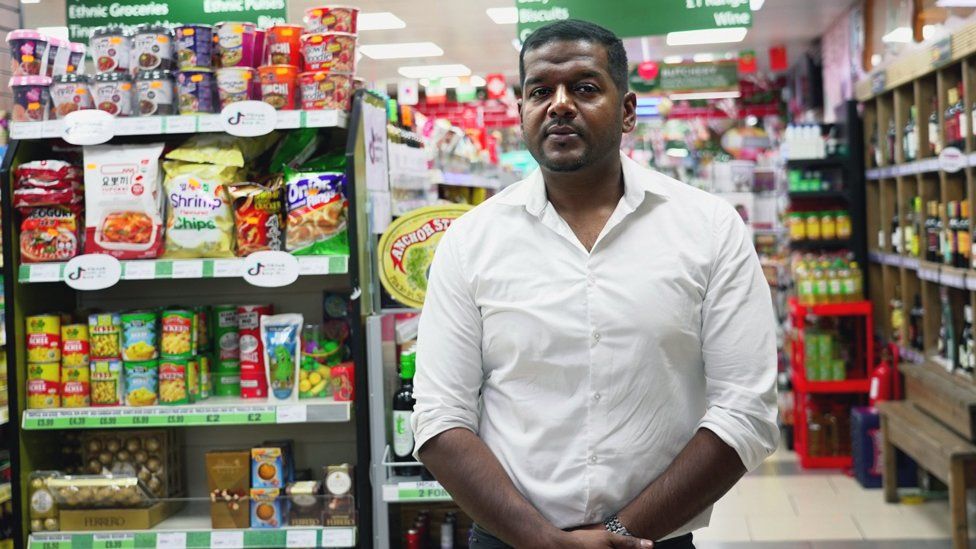
Benedict Selvaratnam at his store in Croydon, south London
By Divya Talwar and Eleanor Layhe
BBC News
A convenience store owner says he witnesses up to nine shoplifting incidents a day, with criminals who are “more brazen and aggressive”.
Benedict Selvaratnam says it is because shoplifters know they are not a police priority.
His situation is being echoed in small shops across the UK, according to the Federation of Independent Retailers.
The group, which represents 10,000 shopkeepers, is calling for government help to tackle the problem.
It says the situation is worsening day by day.
Mr Selvaratnam, from south London, says his staff face both verbal and physical abuse.
He has run his family business, Freshfields Market in Croydon, for eight years and says he has seen a significant rise in shoplifting in the past year.
“We’re getting it from mums who are putting products in prams, we’re getting it from pensioners, children and teenagers coming in on bicycles.
“We’ve seen a big increase in organised gangs stealing to order, whether it’s coffee, honey or meats.”
In the past week, one of Mr Selvaratnam’s employees was taken to hospital after being hit in the head with an iron nail. Another staff member was attacked with a stick of sugar cane.
Some female staff members have left the store over safety fears.
CCTV has captured numerous thefts in Mr Selvaratnam’s shop
One woman, who doesn’t want to be named, says she has been threatened when challenging shoplifters. She says they tell her, “I know what time you close the shop, so let’s deal with this outside.”
The woman now says she’s scared to come to work. “I used to close [the shop] most of the time, but I’m not doing it much now because of those threats when I go outside.”
A glass screen has been put up recently to protect cashiers from abuse, and 34 CCTV cameras have been installed inside the store with another 12 outside.
But that’s not enough to deter criminals, says Mr Selvaratnam.
“We need more police presence, especially in the evenings.”
He adds that incidents often go unreported because “the few times we have called the police, they haven’t come”.
Staff now serve behind protective screens
Mr Selvaratnam thinks the situation is getting worse because the shoplifters know police won’t attend. “[It] emboldens these criminals to continue doing what they are doing and others to follow,” he says.
The Metropolitan Police told the BBC it was not “realistic” for the force to respond to every case of shoplifting because of demand, but that officers would be dispatched “where appropriate”.
The Met added it was collaborating with shops across London to improve reporting of shoplifting.
Muntazir Dipoti, President of the Federation of Independent Retailers, says the situation is urgent.
“I know of members who fear for their lives inside the shops, and others who are making the decision to close up.”
His organisation is calling on the government to provide independent shops with a £1,500 one-off grant to improve security measures.
“The big supermarkets have introduced body cameras, headsets and expensive equipment, but there’s no way most independent retailers can afford that,” he says.
Dame Sharon White, the boss of John Lewis, has told the BBC that shoplifting has become an “epidemic” in the past year..
Figures earlier this year from trade body, the British Retail Consortium (BRC), show retail thefts in England and Wales rose by 26% in 2022.
Its crime survey suggests incidents of violence towards shop staff have also been rising, with staff being threatened with weapons and physically assaulted in some cases.
The BRC previously told the BBC that high levels of theft cost retailers almost £1bn in the 2021 financial year.
A group of 10 larger retailers, including John Lewis, have agreed to fund a police operation called Project Pegasus, which aims to clamp down on shoplifting.
They will spend £600,000 on the project, which will use CCTV images and data from shops to create a target list of the most prolific offenders. This will then form a national shoplifting database.
Policing Minister Chris Philp told the BBC that the scheme will “help all retailers, not just the big ones” in identifying criminal gangs.
Retailers including Tesco, Co-op and Iceland have said they are spending heavily on anti-theft measures, including increasing the number of items with security tags and fitting staff with body cameras.
Waitrose and John Lewis are offering free hot drinks to on-duty officers, aiming to deter criminals by increasing police presence in stores.
However, this is not an option for Benedict Selvaratnam’s store in Croydon.
“We can’t afford to offer the police free drinks or food to encourage them to be in the shop,” he says.
He says he has considered selling up, but that the offers have not been high enough to cover the investment he has made.
“It’s like we have to accept that this is the price of running a small business,” he says.
“Until things improve, we just have to stay here and try to deal with this ourselves.”








